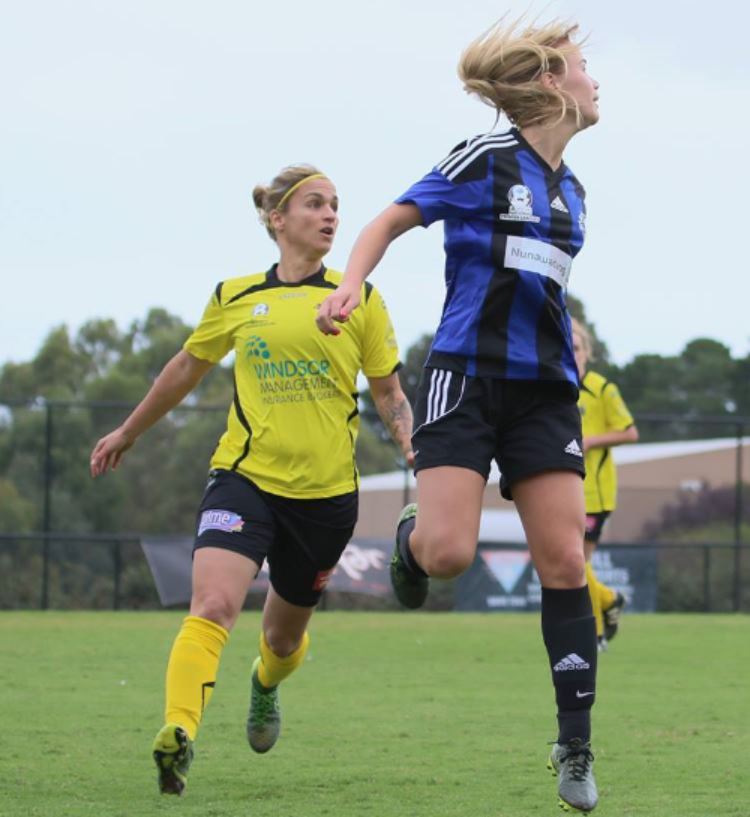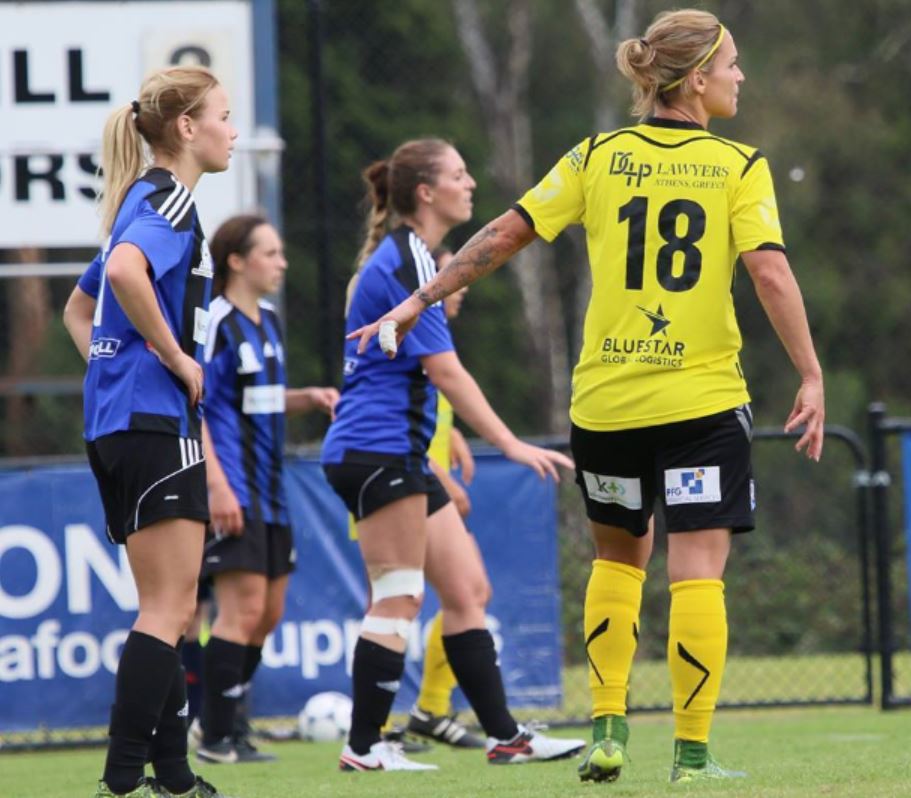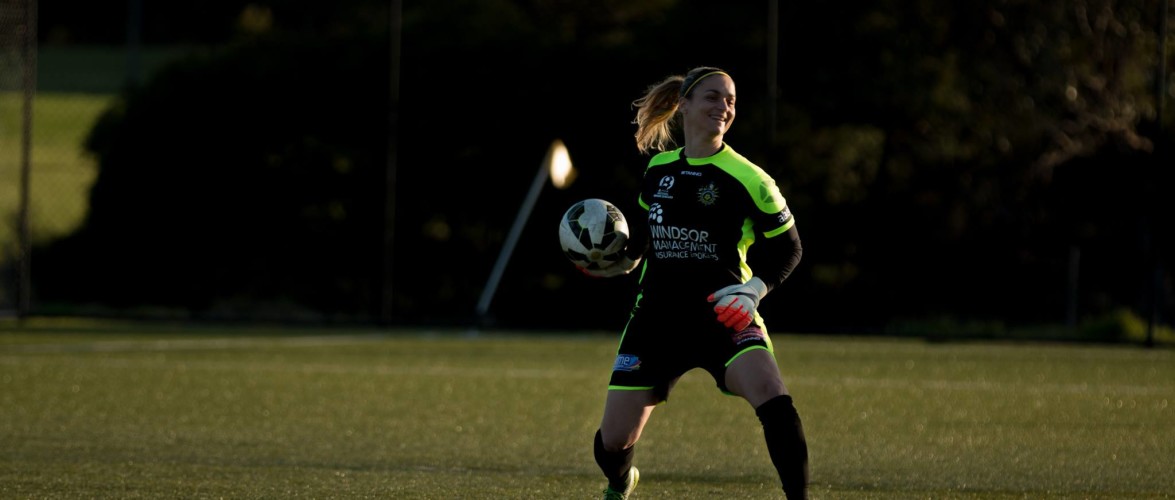Photo: Rachel Bach
Melissa Barbieri has become an icon of Australian football since she emerged for the Matildas back in 2002. But an Asian Cup triumph, four World Cups and 86 caps later, being a legend of the Australian game hasn’t affected the mother and goalkeepers desire to compete and to win.
Following an injury that forced her transition, at the age of 36, from a champion goalkeeper to an outfield player, Melissa still harbours the belief and determination to continue playing at the highest level possible. Hence, Heidelberg United. The former Matildas captain now plays for the Victorian National Premier League side, a side that are extremely proud to have her wealth of experience.
On the night of our interview, she was volunteering her time to make an impassioned speech to Heidelberg’s female youth teams, focusing on their ability to achieve at the premier level, but pulling no punches on the work it will take them all to get there.
She began by bluntly demanding that every player listening should strive to play for Australia. When asked if that’s their goal, a nervous spattering of hands rise into the air. That’s clearly not good enough for Barbieri and she has no hesitation in letting them know.
“You all play for a National Premier League club. You may not know what that means, but it means that you have a direct pathway into the W-League, and then into the national team.
“The next step is a huge increase in level, but unless you’re dedicated to improving yourself, you have to ask is this the club for you. This is a high performance club.”
She breaks to ask the girls what high performance means, “It means that if you have the right attitude, you will get noticed.”
Her passion and commitment are immediately obvious to all listening, but so was a direct humbleness brought about by the myriad of challenges she has had to face throughout her career.

“I have 86 caps for Australia, but I’m the last person to leave at the end of training. I’m the one to pick up everyone’s rubbish off the bench. Do I have to? Of course not, I do it because I respect the club. You all have to respect the club, and what they can offer you.”
Her dedicated nature is overtly evident in her attitude towards her playing career at this stage. Far from winding down the clock, or demanding respect based on past achievements, Melissa attempts to earn it at every opportunity.
“I’m just happy just to be of use. Playing on the field, there was a period where I was starting, then coming in off the bench, then starting. If you don’t play at all, then you kind of feel useless, so I’m just happy to feel useful really.”
It’s this approach that has allowed a goalkeeper, who many in the media doubted due to her short stature (5’6) to have such a glittering career. It has also encouraged her longevity, despite the significant hurdles she has faced. After giving birth to her daughter, Holly, in 2013, Barbieri was clubless and had been finally usurped for her goalkeeping position within the Matildas. Two years later, she had just won the W-League goalkeeper of the season with Adelaide United, and was about to appear at the 2015 World Cup.
She spoke honestly to the girls about these struggles during her career. Having to “move to Adelaide with a new baby” to keep her dreams alive. She also spoke in detail about friends, and how “some friends will hold you back, keep you at their level…if their real friends they’ll know you, and support you.”
She jokes, “The parties you miss out on, they’re all worth it in the end. People stopped inviting me to parties years ago, partly because I’m not a good dancer, but because they know I won’t come.”
You get the feeling nothing could ever hold Barbieri back, which makes her an invaluable influence on the next generation of Australian footballers. However her career is still far from over.
Despite playing as a keeper in the semi-finals of Heidelberg’s Team App Cup campaign, both scoring and saving a penalty in the shootout (“Didn’t save as many penalties as I wanted”) she currently sits as the Bergers’ equal top scorer in that competition.

Asked, given her reputation, whether she felt a keen sense of pressure playing at this level, Barbieri was predictably optimistic.
“Not really, I just know the girls look to me to help them on the field. There’s got to be balance, you don’t want to be coaching too much, talking too much, and not make the saves required”.
“I sometimes forget about my role…the worst part for me is that I haven’t been able to keep a clean sheet so it’s been a learning factor for me as well.”
Balancing a mentoring role with a playing position within a team is never easy. Her forthright demeanour, combined with her desire to keep learning whilst teaching does impart the successful qualities needed in a coach, something that Barbieri seems to be acutely aware of.
“I’m still learning at this level…(in the semi-final) I made a girl cry, but she came out in the second half and played far better. Now that’s obviously something I need to learn from, not make it a habit, but perhaps that’s something she needed.”
Self-belief, grit and resolve will no doubt be pivotal qualities needed throughout the side when they come up against the second-placed Bulleen Lions in both the league and the Team App Cup Final in the next fortnight. Barbieri believes the team has this in spades.
“Football is one of those games where if you’re really on song, and ready to go, anybody can win on the day. Bulleen’s a powerhouse in our league at the moment, but if we can find those little gaps within their performances and exploit them, we can win.
“Our heart and determination in this team is probably the best I’ve seen in the NPL and a will to win and work hard for each other is always prevalent so we will look to that as much as possible”
Looking ahead to the future of women’s football in Australia, Barbieri believes the game still has a long way to come. However from a 14-year-old girl who “wasn’t able to play as there was no all-girls sides” to a Matilda who until 2008 played for Richmond SC, the only female in a professional men’s division, Melissa has seen the game develop exponentially throughout her career.
The more players of Barbieri’s level and experience that play in the National Premier League level, the faster the women’s game in Australia will continue to develop and the less some critics will be able to continue trying to deny women’s football the respect it deserves.
As for next year, Barbieri has no plans of going anywhere, having settled in well at Heidelberg United. However for the next year of the National Premier League, Barbieri believes clear goals have to be set and accomplished.
“It’s still a young competition, in the first year there was always going to be a factor of female football and football. It’s male and female football. As long as we keep remembering that there are two sides to this story then we can continue to push forward.
“The amount of work that we can be doing off the field, in the training sense and making sure the girls are getting as many opportunities to learn as possible, that’s the main focus for the next year I think.”
Originally posted on Heidelberg United Women’s FC Facebook page. Re-distributed with permission.

